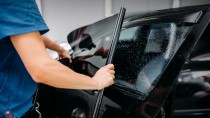The technology of tinting windows in the car: what are the stages of the process
25.10.2023 20:02
 Tinting the windows of vehicles is a popular and highly demanded practice that gives the car a stylish, completely new appearance and at the same time provides a number of practical advantages.
Tinting the windows of vehicles is a popular and highly demanded practice that gives the car a stylish, completely new appearance and at the same time provides a number of practical advantages.
However, in order to avoid problems with the law and ensure safety on the road, it is important to follow certain rules and recommendations. Only experienced craftsmen should order car window tinting. After all, in this way, it is possible to ensure the quality and efficiency of the work performed.
Why should windows be tinted?
This process is able to significantly reduce the amount of ultraviolet rays entering the interior of the car. This protects the driver and passengers from the harmful effects of solar radiation, and also helps to prevent aging and fading of the interior of the car. Tinting also effectively reduces the heat load in the cabin, which is especially important on hot days. This provides a more comfortable environment for driving and traveling. The shade of the glasses can provide more privacy in the cabin. This protects you from unwanted attention from others and hides your privacy. Note that window tint portsmouth also needs to be trusted by experienced professionals. In this case, it is necessary to familiarize yourself with the requirements of the Portsmouth Law.
Basic rules
Before starting tinting, it is necessary to correctly determine the choice of materials used so as not to damage the car. Purchase tinting films from reliable manufacturers and install them with the help of experienced specialists. This guarantees durability and efficiency of tinting. It is also necessary to ensure that visibility is not impaired at night. Too dark films can create dangerous driving conditions. In most countries, the law requires that the front window be completely transparent. Remember this rule so as not to break the law. Many prefer ppf car, which have proven themselves from the best side.
Care Tips
When cleaning tinted windows, use soft rags and special cleaning agents to avoid scratches and damage to the films. Try to avoid contact with aggressive chemicals such as acetone or solvents, as they can damage the tinting. Check the tinting condition regularly. If you notice bubbles, chips or detachments, contact specialists for repair or replacement.
Копирование материалов без обратной активной гиперссылки на сайт, запрещено!